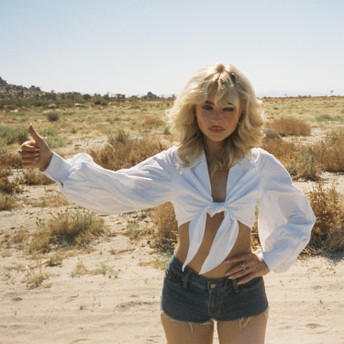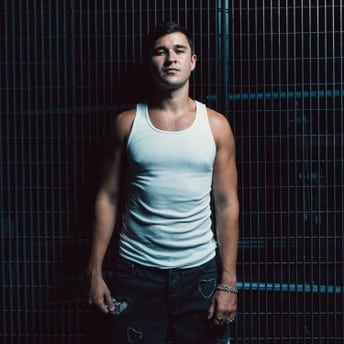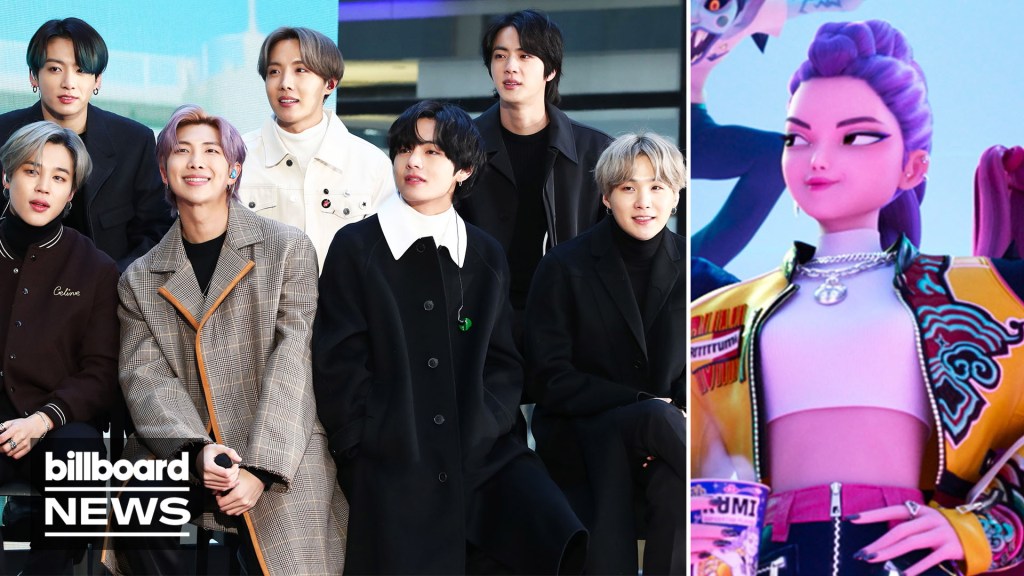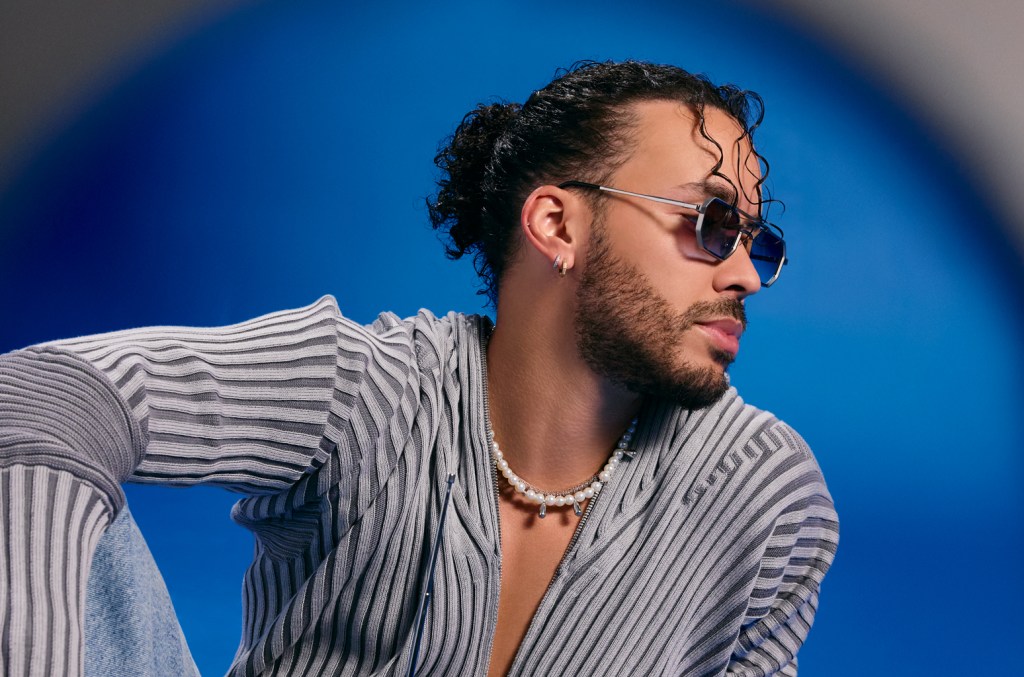News
Page: 7
Trending on Billboard
ROSÉ and Bruno Mars’ collaboration “APT.” has officially been crowned the biggest song of 2025 across Apple Music.
The track topped the streamer’s year-end Replay ‘25 recap as the most-streamed song globally, most-identified on Shazam, most-spun on radio, and the track with the most-read lyrics of the year.
The hit duet was part of Apple Music’s Replay ‘25 experience, which launched today (Dec. 2) and gives users a deeply personalised recap of their listening habits across total minutes, top artists, genres, and monthly trends — alongside expanded tools for artists and teams to track fan growth and global impact.
Explore
See latest videos, charts and news
Alongside “APT.”, major names like Kendrick Lamar, SZA, Billie Eilish and Lady Gaga also featured heavily across Apple’s full suite of charts. Kendrick and SZA’s joint track “luther” landed at No. 2 on the Top Songs of 2025: Global, with “Die With A Smile” by Lady Gaga & Bruno Mars rounding out the top three.
Apple Music’s Artist of the Year, Tyler, The Creator, also made his mark with “Sticky (feat. Sexyy Red, GloRilla & Lil Wayne)” coming in at No. 42 on the global chart — his first time appearing on the year-end list. Meanwhile, rising stars like Gracie Abrams (“That’s So True”) and Alex Warren (“Ordinary”) landed in the top 10, marking breakout years for both.
Fans can explore their full Replay dashboard in-app, including new monthly breakdowns, loyalty metrics, comeback artists, and All Time playlists based on historical listening data. Artists, meanwhile, can access powerful new insights into their reach, listener growth and performance across Shazam, radio, and playlisting.
To celebrate, Apple Music also launched The Replay Gallery at Miami Art Week — a physical exhibition inspired by the year’s most defining musical moments, with work from artists like Calida Rawles, Henry Taylor, and Jeremy Deller.
More Replay charts, artist dashboards, and playlists are available now via the Apple Music app.
Top Songs of 2025: Global
ROSÉ & Bruno Mars – “APT.”
Kendrick Lamar & SZA – “luther”
Lady Gaga & Bruno Mars – “Die With A Smile”
Kendrick Lamar – “Not Like Us”
Billie Eilish – “BIRDS OF A FEATHER”
Top 100: Shazam
ROSÉ & Bruno Mars – “APT.”
Lola Young – “Messy”
Lady Gaga & Bruno Mars – “Die With A Smile”
Alex Warren – “Ordinary”
MOLIY et al – “Shake It To The Max (FLY) [Remix]”
Top 100: Global Radio
ROSÉ & Bruno Mars – “APT.”
Lady Gaga & Bruno Mars – “Die With A Smile”
Lola Young – “Messy”
Alex Warren – “Ordinary”
Billie Eilish – “BIRDS OF A FEATHER

Trending on Billboard
While performing the song “Juno” on her recently wrapped Short ‘n Sweet tour, Sabrina Carpenter would “arrest” a fan or celebrity in the crowd in a fun moment involving pink prop handcuffs. The bit was a viral sensation during the outing that ended last month and it was accompanied by another viral favorite section where Carpenter would ask the crowd if they wanted to try out some “freaky positions,” before busting out a unique pose and saying “Have you ever tried… this one?”
Explore
See latest videos, charts and news
On Monday (Dec. 1), the White House once again appropriated a playful pop culture meme to shine a light on its attempt to deport undocumented people. In a 14-second TikTok video cued to “Juno,” a series of people are shown angrily filming ICE agents as they swoop in to arrest people on the street, with close-ups of handcuffs being slapped on someone. A series of clips of chases and arrests are then cued to Carpenter asking, “Have you ever tried this one?”
The caption to the clip reads “Have you ever tried this one? Bye-bye [kissy face emoji].”
At press time, a spokesperson for Carpenter had not returned Billboard‘s request for comment on the video; Billboard has also reached out to the White House to clarify if it got clearance from Carpenter to use her music in the ICE propaganda video.
The video dropped less than a month after Olivia Rodrigo lambasted the Trump administration after the Department of Homeland Security posted an Instagram video soundtracked by her Guts track “All-American Bitch” showing ICE officers forcibly tackling, detaining and deporting people. In the comments, Rodrigo wrote, “don’t ever use my songs to promote your racist, hateful propaganda.” The video featured a montage of what appeared to be undocumented people voluntarily boarding DHS flights and giving a thumbs-up as they depart. “LEAVE NOW and self-deport using the CPB Home app,” read the caption. “If you don’t, you will face consequences.”
Carpenter, a vocal supporter of Trump’s 2024 election rival Vice President Kamala Harris, is the latest artist to object to the president’s repeated use of popular music for his political videos without their permission. The pace of such seemingly unsanctioned usage has ramped up over the past few months, with Kenny Loggins lashing out at Trump for using his Top Gun classic “Danger Zone” under an AI-generated video of the president seemingly dumping a river of fecal matter on American citizens participating in the anti-Trump “No Kings” protests.
Swifties also aired their ire at the White House last month over a TikTok video set to Swift’s hit Billboard Hot 100 chart-topping single “The Fate of Ophelia,” renamed “The Fate of America,” depicting Trump’s mug shot from when he was charged with trying to overturn the 2020 presidential election results as well as an image of POTUS kissing an American flag. While Swift — an avowed Harris supporter who Trump has repeatedly said he “hates” — has not commented on the seemingly unauthorized appropriation of her music, the White House sent a response to Variety in which it gloated about owning the libs.
Representatives said they made the video specifically to get “fake news media brands” to “breathlessly amplify” their message. “Congrats, you got played,” the rep said.

Trending on Billboard
If you’ve ever wanted to get to know Lady Gaga better Stephen Colbert is here to help. On Monday night’s (Dec. 1) Late Show, Colbert revisited an interview he did with Mother Monster earlier this year at New York’s The Bitter End nightclub, during which she participated in his seriously silly Colbert Questionert interrogation.
The host hit her with an easy one early one: the best sandwich. Well, it wasn’t that easy. Gaga quickly answered Italian sub, but then busted out her impeccable French to give props to ham, butter and cheese on a baguette. “So an Italian sub, but in French,” Colbert clarified.
Then things started to get a bit more serious with a query about the first concert Gaga ever attended. Turns out it was a Jingle Ball show where the Goo Goo Dolls played amid a flurry of fake snow that broke her brain. “They had snow and I was losing my mind. It was my first experience with production in an arena. I was crying,” Gaga recalled.
According to Gaga, the scariest animal is any really large bird, like a big, scary hawk that might spirit you away to its nest and, if she had to choose between apples and oranges, she’d definitely go orange, seemingly to Colbert’s chagrin.
“You judged me,” she said in mock horror. I felt you go, ‘oh, New York, big apple!’” No, Colbert explained, it’s just that you can’t spread peanut butter on an orange, though Gaga did remind him that you can dip an orange in dark chocolate, which seemed to ease his mind.
To her recollection, Gaga said she’s never asked another famous person for their autograph, but when fans give her a piece of their art she does ask them to sign it.
And then came the big one, or as we like to call it the Keanu Question: what do you think happens when we die? “I’m not sure,” Gaga admitted with a heavy sigh. “I think we all vanish into each other. I say that on stage every night, but I think it’s just what I believe… Like I definitely believe that the soul is like kind of forever here in some way. That you go from being in one place to being everywhere.” Asked if she could sometimes sense those souls, Gaga said yes, that sometimes when people pass she thinks “‘they’re everywhere now.’”
Gaga said her favorite action movie is the 1993 Clint Eastwood political thriller In the Line of Fire, that she prefers a window seat for a feeling of safety and that her favorite smell is, awww, the scent of her fiancé Michael Polansky’s neck, noting that he doesn’t wear cologne and that bottled scents are her least favorite smell.
For a probing question about her earliest memory, Gaga got existential, asking for a clarification about whether it was her earliest memory in life. “Or before life if you can think that early,” Colbert shot back. Turns out the first thing Gaga can remember is getting really excited when her parents gave her a toy kitchen set. “I remember being really excited because I could play house,” she said.
As for what song Gaga would pick if she only had one tune to listen to for the rest of her life, Gaga chose John Lennon’s “Imagine,” explaining that she grew up very close to the Strawberry Fields Lennon memorial in New York’s Central Park. “That has a very special significance for me,” she said.
And finally, she described her life in five words: “It’s going to be great, hopefully.”
Gaga is preparing to wrap up her Mayhem Ball tour dates for the year with a pair of upcoming shows at Marvel Stadium in Melbourne, Australia on Friday (Dec. 5) and Saturday (Dec. 6).
Watch Gaga take the Colbert Questionert below.
Trending on Billboard
Parkway Drive’s planned Park Waves Festival — the band’s first-ever touring festival in Australia — will no longer go ahead.
Organisers Destroy All Lines confirmed the cancellation, posting a statement across social media explaining that the numbers behind the ambitious run “no longer stack up.”
“We’re devastated to confirm the Park Waves Festival Australian tour will not go ahead,” the statement read. “The cancellation is due to a combination of challenges, and ultimately, the numbers no longer stack up. With a heavy heart, we’ve had to make a difficult decision. We’ve tried everything. We’re gutted.”
Explore
See latest videos, charts and news
The festival was scheduled to take place across February and March 2026, with stops in Perth, Adelaide, Geelong, Scoresby, Bendigo, Wollongong, Sydney, Maitland, Toowoomba, Byron Bay and Sandstone Point. Ticket holders will automatically receive refunds, with organisers confirming additional details will be emailed directly.
In a separate statement posted to their own channels, Parkway Drive described the decision as “a kick in the guts,” noting the increasingly difficult landscape for major touring events in Australia.
“Another festival being crushed by the rising costs across our entertainment industry,” the band wrote. “It hurts to be another casualty in this chapter of the Australian music scene. We’ve tried every possible option to keep this dream alive, but the reality of the circumstances won’t allow for it.”
Park Waves originally launched in Germany in 2024, where Parkway Drive headlined alongside Fit for a King and Australian heavyweights Thy Art Is Murder. The Australian edition was intended to bring that model home, with the band emphasising their desire to reach regional audiences that often miss out on arena-level tours.
Speaking with Rolling Stone AU/NZ earlier this year, vocalist Winston McCall said the concept had been years in the making. “Being able to take it regional is really important,” he explained. “This is the first Byron show we’ve been able to play in 12 years… If you don’t have an entertainment centre, you’re playing a 1000-cap club and thousands of people are missing out.”
The cancellation follows a milestone era for Parkway Drive, who performed a widely praised, career-defining show at the Sydney Opera House in 2023 and released their single “Sacred,” their first new music since 2022’s Darker Still. Park Waves was expected to be the band’s major domestic live moment for 2026.
Destroy All Lines closed their statement by thanking fans who purchased tickets and continue to support Australian live music during a turbulent period for promoters and touring artists alike.
Trending on Billboard
Taylor Swift is closing out the historic Eras Tour with one more screen event. On Tuesday (Dec. 2), Disney+ released the first official trailer for Taylor Swift | The Eras Tour | The Final Show, a full-length concert film documenting the tour’s final performance in Vancouver, B.C.
Explore
See latest videos, charts and news
Set to arrive Dec. 12, the new film differs from the existing Disney+ version released earlier this year. This edition includes the complete Tortured Poets Department portion of the show, which was added to the tour following the album’s April 2024 release and was not included in the theatrical cut or the previous streaming edit. The Vancouver stop marked the only performance where the entire TTPD set appeared in full.
In the trailer, Swift addresses the crowd directly, acknowledging the weight of the moment. “We’ve had so long to prepare for the end of this tour, and we get to play one last show for you here tonight,” Swift says. “I want to thank every single one of you for being a part of the most thrilling chapter of my entire life to date.”
The Final Show film arrives alongside a companion docuseries, Taylor Swift | The Eras Tour | The End of an Era, which premieres the same day.
The series offers a deeper look behind the scenes of the record-breaking global tour, including backstage footage, rehearsal clips, and Swift’s commentary on how she conceptualised and executed the nearly three-hour production in its various forms.
The docuseries features appearances from opening acts Gracie Abrams and Sabrina Carpenter, as well as special guests Ed Sheeran and Florence Welch.
Two episodes of The End of an Era debut on Dec. 12, with new instalments rolling out in two-episode batches in subsequent weeks. The series is directed by Don Argott and co-directed by Sheena M. Joyce, produced by Object & Animal.
Meanwhile, The Final Show is directed by Glenn Weiss and produced by Taylor Swift Productions in association with Silent House Productions, marking the latest in Swift’s expanding catalogue of concert films and tour documentaries.
The Vancouver performance capped what became the highest-grossing tour of all time, with Swift’s The Eras Tour breaking attendance records, global streaming milestones and reshaping the touring landscape across 2023–2025.
Watch the trailer for Taylor Swift | The Eras Tour | The Final Show below. For more, visit disneyplus.com.
Trending on Billboard
LIV Golf Adelaide has locked in global DJ and producer John Summit as the Saturday headliner for its 2026 tournament, adding another major name to the event’s expanding live music program.
Explore
See latest videos, charts and news
Summit will perform Feb. 14 at 7 p.m. following round three at The Grange Golf Club. The Miami-based artist — who has earned two No. 1 hits on the U.S. Dance Radio chart and multiple Top 10 entries on Billboard’s Hot Dance/Electronic Songs chart — brings his explosive live show to Australia for one of his few local appearances next year. His set is expected to feature fan favorites including “Where You Are” and “Shiver.”
The announcement rounds out a four-day entertainment lineup that already includes Peking Duk, Royel Otis and FISHER. Canberra duo Peking Duk will kick off the music program on Thursday, Feb. 12, performing directly after the opening round with a set that includes their breakout hits “High” and “Stranger,” along with new material. Royel Otis headlines Friday, while FISHER returns Sunday to close out the tournament.
All concerts are included in daily Grounds Pass and hospitality tickets, meaning fans attending Thursday and Saturday events will automatically have access to the live performances. Limited tickets remain available at LIVGolf.com, including Grounds Plus and select premium hospitality packages in the Barossa, Birdie Shack and Ripper Point areas.
For the first time, Summit’s Saturday set will also be streamed internationally on the LIV Golf YouTube channel, part of the league’s push to expand its global fan base.
“LIV Golf is known for bringing world-class DJs and musicians to Adelaide, and we are ecstatic to welcome John Summit this February,” said Ross Hallett, LIV Golf’s executive vice president and head of events. “His high-energy performances perfectly complement the vibe of LIV Golf.”
South Australian premier Peter Malinauskas added that hosting Summit “sets a new benchmark” for the state’s live entertainment offerings, noting that three of the four headlining acts next year are home-grown Australian artists.
Since launching in 2022, LIV Golf has woven live music into the fabric of its tournament experience, hosting more than 30 concerts in 2025 alone — a number expected to climb to 40 in 2026.
Trending on Billboard Rüfüs Du Sol have officially made touring history. The Grammy-winning Australian trio has been recognised for delivering the highest-selling electronic tour of all time, following a record-breaking run of global dates on their Inhale / Exhale World Tour. Explore See latest videos, charts and news The group was presented with a commemorative […]
The pop superstar is the sole writer credited on more than 60 tracks.
12/1/2025
Trending on Billboard This is partner content. Not sure what to get a music lover this Christmas? If you’re looking for the best gifts for ‘KPop Demon Hunters’ watchers, BTS fans and hip-hop lovers keep watching to see what you can get them! Tetris Kelly: What’s underneath the tree for music lovers this Christmas season? […]
Trending on Billboard
Prince Royce‘s cover of Backstreet Boys‘ “I Want It That Way” reaches new heights, as the song climbs 2-1 on Billboard’s overall Latin Airplay chart (dated Dec. 6). The song also banks its fifth week atop the Tropical Airplay list.
“Reaching No. 1 on both the Latin Airplay and Tropical Airplay charts with ‘I Want It That Way’ is incredibly special to me — especially knowing it marks my 19th No. 1 on the former,” Royce tells Billboard. “This song represents a bridge between cultures and generations, and I’m grateful to the fans and radio stations who continue to believe in my music and take this journey with me.”
“I Want It That Way” rises 2-1 with 10 million in audience impressions in the United States during the tracking week ending Nov. 27, as reported by Luminate. The song’s 23% improvement from the week prior ejects Karol G and Feid’s “Verano Rosa” from No. 1, as the latter drops to No. 9 with a 5.3 million impressions, down 35%.
With the reimagined “I Want It That Way,” Prince Royce earns his 19th No. 1 on Latin Airplay. The track debuted on Tropical Airplay in August and has now spent five weeks atop that list.
Royce strengthens his position as the tropical act with the second-most rulers on the 30-year-old Latin Airplay chart, trailing only Romeo Santos, who continues to lead with 22 chart-toppers.
“I Want It That Way” builds on the success of the album Eterno’s first single, a redux of the Bee Gees’ “How Deep Is Your Love,” which became Royce’s first track from his top 10 set to reach No. 1 on Latin Airplay (one week in June).
As mentioned, “I Want It That Way” adds a fifth week atop the Tropical Airplay chart, matching the No. 1 run of Royce’s “How Deep” track.
Elsewhere, thanks to its radio haul, the song rises to its No. 23 peak on the multimetric Hot Latin Songs, which combines radio airplay, streaming activity and digital sales into its formula.
El Fantasma Wins Big: Beyond the new No. 1 on the overall Latin Airplay chart, the Regional Mexican Airplay ranking sports a new winner, El Fantasma. The singer-songwriter’s new single “La Lotería” jumps 3-1 for its first week in charge, following a 43% gain in audience impressions during the tracking period, to 8.1 million.
Released via Afinarte Music in July, “La Lotería,” a slow but steady climber on Regional Mexican Airplay, earns El Fantasma a ninth chart-topper, and his second ruler of 2025 (“Ya Me Vale Madre” reigned for one week in June).
The song also breaks new ground on Latin Airplay, moving from No. 9 to No. 3.
All Billboard charts dated Dec. 6 will update tomorrow, Dec. 2, on Billboard.com.

 State Champ Radio
State Champ Radio 






